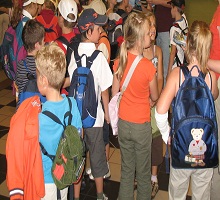Children with movement disorder

Excessive activity in a child is one of the main symptoms that there is something wrong. It gives a signal that something is happening which can not be solved in child's thought process, evaluated or expressed. Therefore, in any such behavior, the cause must be sought primarily in the child's environment and find the cause of his behavior.
Excessive activity may reflect a momentary anxiety or tension. When a child has experienced something exciting and wants to tell his story, it is accompained with hopping, running, but as soon as you hear him, the discomfort quickly subside.
Similarly, this behavior may occur if the child is upset about something, or something bad happened to him and do not want to tell parents about it or do not know how. When parent finds out, the child behaves inexplicably, disobedience can associate to already vital behavior, child does not respect anything like if he provides defense against feelings of helplessness and anxiety in this way.
Excessive activity may be classified as a behavioral disorder when it remains as a permanent feature of child's behavior, independent from the situation and momentary mental state. Restlessness and agitation in preschool age appears to be a physiological manifestation or benign temperament trait, but it begins to be a problem when child starts school. The child can not adapt, he becomes something that hinders and disrupt others. Early detection is therefore very important and proper upbringing may dampen the child's expression because then, the damage will be very difficult to repair.
Whether child's restlessness stems from his momentary anxiety, or is characteristic for his temperament, or his behavior is diagnosed as hyperactive syndrome - excessive activity with motion disorders characters, in all cases, the key to the success is positive parenting based on understanding.
How to handle a child with motion disorder:
- Always talk with your child calmly and slowly.
- From an early age, notice all the positive behavior of the child and often praise him
- Praise child verbally for his efforts even though the outcome of the activity is not perfect.
- Explain everything clearly, calmly and briefly (take into account age, what you will explain to the three years old will not be sufficient as an explanation of the seven-year and vice versa).
- Strictly skip bans with form of "No" when communication with child (do not do, not, not touch, no...), put an emphasis on the explanation of why, what kid is not allowed to do it.
- Show and patiently practice each new activity that the child must learn
- Do not ask the child to perform tasks that are inappropriate for his abilities.
- Gradually, transfer the responsibility on the child, it is very important for his development.
- You should made a daily program for a children in preschool and school-age to make it clear when child would get up in the morning, eat, play, learn, help at home, watch TV, go out, go sleep and so on. The program should be respected, even if from time to time you make changes, and here, it should be noted, that this distortion is not always caused by a child. Many parents disobey it because of their own reasons and do not realize this fact. If they do not explain it properly, then forcing the child to obey it will not persuade him to accustom to it.
- Compliance with family rules is very important with no difference for all children in the family, of course, always taking into account the age.
- Separate the behavior that we do not like from the child's personality - always remind him that we love him, but tell him that we do not like what he done wrong, or how inappropriate was his behavior.
- When child does something wrong, do not be too though, but at the same time not too modest
- It is also very important to stick with set educational measures. If we cancel one of them too early, we hardly be able to apply it again later.
- If the child have a tantrum, we do not solve anything during it, we do not lecture or argue and certainly do not try to raise your voice. The child often calms with our look into his eyes, and touch helps sometimes - caress, grabbing, to which often child reacts rather irritated.
- Do not reject the child or punish for failures in the activities, including school failures related to the increased need for movement or reduced ability to concentrate.
- Failures should not be considered as laziness or deliberate disobedience.
- Do not highlight the school failures at home, do not constantly mention them or compare the results with siblings or other children peers.
- The child should have solidified sense of self-worth, self-confidence and respect for oneself.




